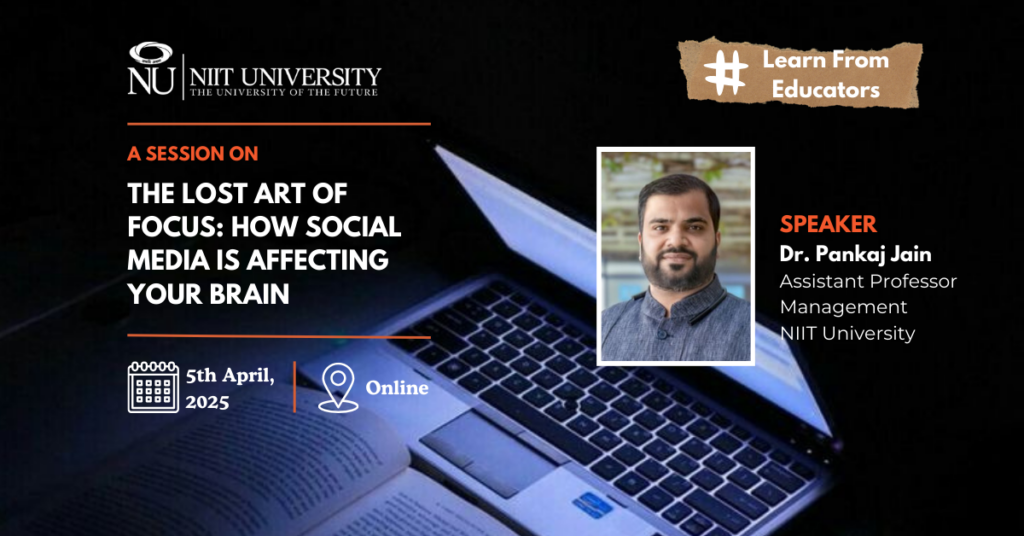Watch us in portrait mode to discover what makes us different.

On 5th April 2025, Dr Pankaj Jain, an Assistant Professor of Management at NIIT University, organized an inspirational session titled “The Lost Art of Focus—How Social Media is Affecting Your Brain.” The session was organized under the Learn From Educators series and was more like an awakening regarding how our ability to focus is now becoming another weak spot through which our online lives are destroying what has long been an asset.
As Dr. Jain would say, concentration isn’t natural. It’s built up, as with muscle, over a period. The secret? Similar to an efficient gym routine, you need:
• Hard work exercises (e.g., brain weights)
• Rest time (in the guise of quiet, meditation, and being offline)
• Avoid junk (junk food = social media).
He makes a good analogy: junk food makes your body weak; social media makes your mind weak. Small doses of dopamine from likes and reels provide no real sustenance to your brain.
Dr. Jain pointed out how this generation is going through a seismic shift in the way their brains consume and process information. With diminished attention spans, the constant interrupting of social media notifications, and mounting pressures to be instant gratified, young minds are being conditioned to constant entertainment.
He referenced careful work in books such as Nicholas Carr’s “The Shallows” and Jonathan Haidt’s “The Anxious Generation,” which describe how overuse of the internet and social media not only rewires the brain but also drives more mental illness, especially among the youth.
Dr. Jain provided an excellent metaphor for the observable physical muscles and the intangible muscle of attention.
Physical fitness is the simple one to observe, while attention is measured in terms of small behaviors and habits one gets into every day. He employed everyday anecdotes to relate this—like the struggle to stay present while reading an article of 10 pages, the jitters of being phoneless, or always trying to multitask due to FOMO (fear of missing out). These signs, he added, reveal a shrinking attention span and point to how distractions today quietly pilfer from us the ability to concentrate.
Both as a teacher and as a parent, Dr. Jain has seen that students these days will give up too readily when faced with something challenging. Most of them can’t work on a puzzle for longer than a few minutes. Attention is certainly not intellect, he says—but your ability to remain at one thing despite distractions. A computer geek, a farmer, or even a housewife may be more focused than average if they discipline their brains.
1. Social Deprivation—More friends online but solitary in real life.
2. Sleep Deprivation—Late-night binge-watching rewires your internal clock.
3. Attention Fragmentation—Can’t maintain attention for more than a few seconds? That’s your brain reshaping to expect “quick hits.”
4. Addiction—Dopamine cycles that keep pulling you in—likes, shares, and comments become who you are.
Even during nature walks on a beautiful green campus, students tend to reach for their phones rather than being present. “If Lord Krishna came today, the first thing some students would do is take a selfie,” Dr. Jain jokes.
He warned, Screens are taking the place of real-life experiences.
Dr. Jain stresses that boredom must be embraced by students. When the body feels hungry, it is reminded to eat. Similarly, when the brain feels bored, it is reminded that it needs time off.
Continual stimulation by cell phones does not allow students to become creative, patient, and rich thinkers.
Advice that was practical and actionable was provided by Dr. Jain to assist students in taking back their attention in this distracted age.
He discussed the need to unplug daily—to disconnect from screens and give the mind a little space to breathe. Reading books, 10 pages a day, reconditions the brain to focus. He advocated one-tasking rather than multitasking to have more focused minds. Mindfulness activities like sitting silently for five minutes can bring inner peace. Enclosing the digital world, e.g., refraining from mindless scrolling or binge-watching, saves mental energy. Above all, he encouraged students to put real-world connections first by logging off for a bit, reminding everyone that quality relationships are not screen-based.
As students and professionals-to-be, refocusing is the path to greatness. Dr. Jain reminds us:
“Focus is not about doing things quickly. It’s about doing things deeply”.